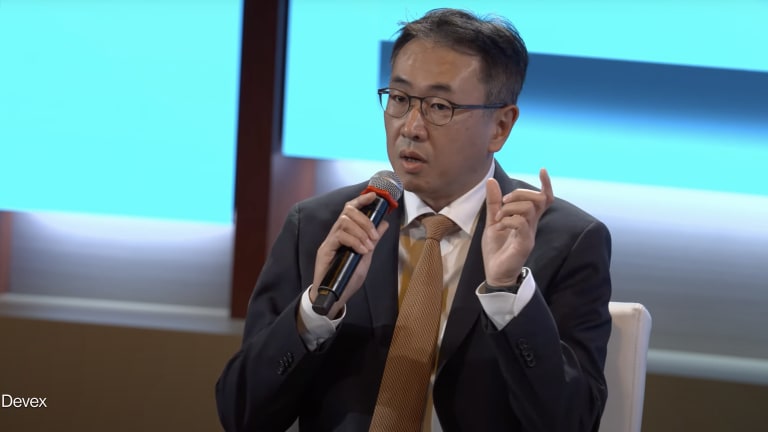
SAN FRANCISCO — The COVID-19 pandemic could help fast-track the partnerships needed to spread broadband internet access, Makhtar Diop, World Bank vice president for infrastructure, said at last week’s World Bank annual meetings.
Recent months have seen a surge of initiatives to boost affordable connectivity. Telecom companies, for example, are increasing internet speed and capacity at no added cost to their consumers.
Working with partners to ensure the World Bank’s client countries have the infrastructure they need to provide their populations with affordable and reliable internet connections is a top priority, Diop told Devex.
“We all have an interest in accelerating the development of digital access in Africa.”
— Makhtar Diop, vice president for infrastructure, World BankDiop, former World Bank vice president for Africa, oversees the energy and extractives and digital development departments as part of his practice.
“I see a lot of links between energy and digital,” he said. “It’s not only that energy is needed for digital. But also digital could be a big solution to accelerate access to electricity.”
He described how a telecommunications company might finance rooftop solar panels to power their operations, track consumption on a handset, and have customers use financial technology, or fintech, to pay for the service.
What is the World Bank without international travel? (Pro)
For years, the World Bank has faced questions about its liberal travel policies and budgets. Now the institution's leaders are asking how it can continue to provide global expertise and supervision at a time when travel is nearly impossible.
“So it’s a really nice dynamic we are seeing now which is really bringing everything together and leapfrogging,” he said.
Traditionally, telecom operators have not embraced a shared infrastructure approach, which would allow them to expand coverage and reduce costs in the deployment of their networks.
“Each provider has its base station which is proprietary and in fact, it reduces competition and reduces access,” Diop said.
Organizations working on digital infrastructure want to ensure that examples of infrastructure sharing in the context of COVID-19 continue over the long term.
The World Bank and other partners authored a joint action plan in April proposing a number of actions to increase the bandwidth of networks facing a surge of traffic, support digital business models, and enhance the safety and security of digital services.
For example, it explains that countries can free dark fiber, or unused fiber optic cable, and make it available for internet service providers.
As telecom operators and internet service providers work to strengthen digital infrastructure, tech giants are also looking to increase bandwidth, Diop said. Google and Facebook are building undersea cables to improve internet connectivity in Africa. Diop emphasized the need to build the fiber-optic network beyond big cities so that people in rural areas can access faster connections.
“We don’t want this to just be a proprietary infrastructure where people are putting a very high premium to be able to access this,” he said. “We would like it to be open access and to offer a level playing field and not be a club.”
In addition to promoting shared infrastructure, Diop and his team are focused on lowering the costs of handsets.
“We have some countries which have good coverage but unfortunately the cost of the handset is too high,” he said.
Cybersecurity has emerged as another priority. As the African continent gains access to higher speed internet, an increase in cyberattacks has followed, Diop explained.
He also outlined the need for the World Bank to work in closer partnership with the private sector on digital skills initiatives on the African continent, and suggested that it might start with a few countries where they can align their efforts.
In the next year, Diop expects to hold additional conversations with Africa-based philanthropists and companies to invest in the digital sector. These groups know the ecosystem, he said, and could attract further investment.
Diop seemed hopeful that the cooperation resulting from the pandemic might help to address the lack of trust between the private sector and the government that has held back progress on global broadband access.
“I think it’s time now to realize we all have an interest in accelerating the development of digital access in Africa,” he said.








